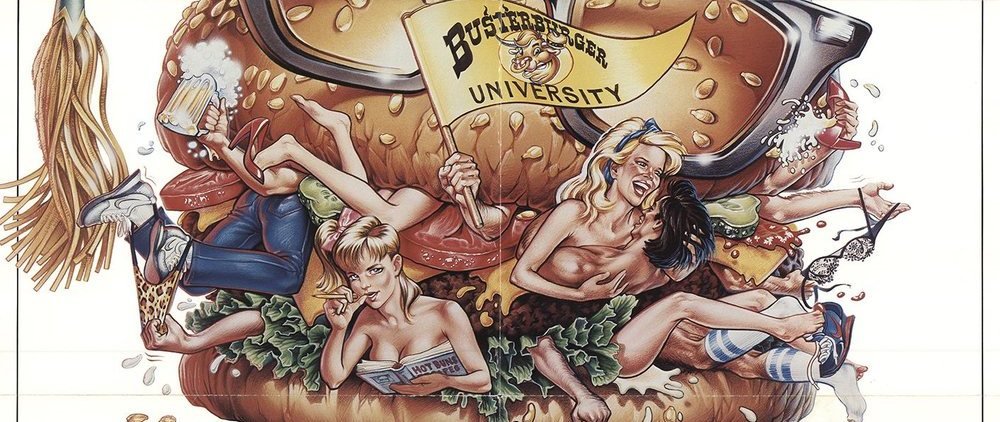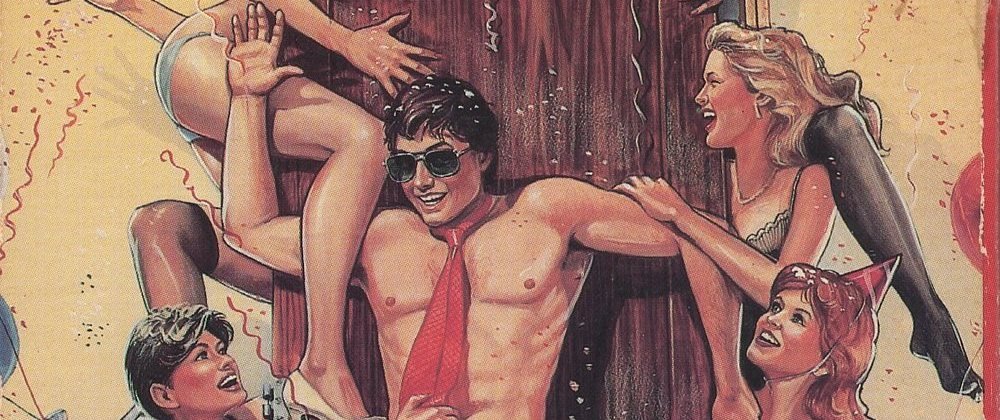TEEN MOVIE HELL: Hormones And Hijinks Through The Pop-Cultural Funhouse Mirror
The phrase "rite of passage" is thrown aroundwith nostalgic abandon when people discuss the pop culture of their teen yearsbut it still means something when applied accurately. Such a phrase shouldn'tbe limited to the stuff you still think is cool or the whims of revisionisthistory.
For example, if you came of age during the '80s, theteen sex comedy was a big deal. Critics hated these films, your parents didn'twant you watching them and once you got old enough, they lost their cool factorand were consigned to back of the junk closet. However, they remain relevant pop culture artifacts, a kind of funhousemirror built out of hormonal urges, shameless humor and commercial exploitationwhose reflection reveals more about the culture that spawned them than anyonemight want to admit.

After a long wait, this fertile and underexplored topic has finally gotten a thought-provoking exploration in Teen Movie Hell. This collection of reviews and essays was masterminded by Mike "McBeardo" McPadden of Heavy Metal Movies fame. In a timely and interesting touch, he has collaborated with a number of noteworthy female voices from the cult movie criticism world to create a volume that hits a nice balance between appreciating the fun of these films and finding the intriguing, often accidental cultural commentary lurking beneath their madcap surfaces.
The heart of TeenMovie Hell is an expansive array of reviews ranging from two paragraphs totwo pages. The focus is primarily on films from American Graffiti in 1973 until the mid-90s when it faded on theback of direct-to-video fare like BikiniDrive-In. The majority of the keytitles - Animal House, Meatballs, Fast Times At Ridgemont High, TheLast American Virgin, Valley Girl,Screwballs, Porky's, Zapped, etc. -all get discussed here alongside an array of lesser-known quickies. In aninteresting touch, a few influential pre-cycle films are included like HaroldLloyd's The Freshman, the proto-teenrebel opus Zero For Conduct and theinfluential Beach Party.
The majority of these reviews were penned by McPadden andtake on a voice that blends gonzo humor and wordplay with a sharp take on whatworks and what doesn't in these films by modern standards. He's not afraid todefend movies that would be chewed up and spat out with disgust by mainstreamcritics and annoyingly "woke" youthful revisionists: cases in pointinclude entertaining defenses of films like Screwballs, Hamburger: TheMotion Picture and The Party Animal.

However, McPadden is also not afraid to admit when afilm's excesses veer into wrongheadedness: there's an artful assessment of Revenge Of The Nerds that confronts howsome of its key gags fall on the wrong side of topics like rape and revengeporn, an unfortunate misstep that mars a movie that is otherwise quitelikeable. Similarly, he isn't afraid to take down sacred cows like the work ofJohn Hughes: there are scathing reviews of FerrisBueller's Day Off and SixteenCandles that take exception with how Hughes built his films around pamperedsuburbanites, communicating a conformist viewpoint that sided with the snobs inthe teen sex comedy's timeless "snobs vs. slobs" debate.
A select few reviews are penned by female critics andthey consistently grab the viewer's attention by offering different writingstyles and viewpoints: Heather Drain offers a wistful take on Blue Summer that reflects that film'sstyle, zine veteran Lisa Carver offers up a take on Night Of The Comet that mixes witty observations on '80s life witha sympathetic nod to millenials and Christina Ward unleashes an incendiary "counterpoint"take to McPadden's Valley Girl reviewthat is so angry it'll scorch your eyebrows. Interestingly, the best of theguest reviews come from Rachel McPadden, McBeardo's better half: her keenassessments of Foxes and Little Darlings really bring the readerinto a woman's viewpoint on these unique, teen girl-sympathetic classics.
Woman writers also shine in the essays that bookend themain reviews section. Highlights inthese areas include a piece by Kat Ellinger that defends in the artistic andcultural-commentary value of teen sex comedies in this overly censorious modernera and a reminiscence by Wendy McClure about how Fast Times At Ridgemont High demystified the concept of abortionfor her at a time when the topic was verboten. There's also a well-researched and thoughtfully written piece fromKier-La Janisse about the "sexy schoolteacher" subgenre and thedifference between what the '70s and '80s entries in it said about women, theirsexual agency and feminism. That said,my favorite of the essays is a brief autobiographical piece from the greatEddie Deezen, the uber-nerd of teen cinema. It turns out he's pretty funny inwritten form, too.

You probably won't agree with everything in Teen Movie Hell: for example,Schlockmania likes Porky's II: The NextDay much more than McPadden does (that insane third act remains a peak ofteen sex comedy lunacy) and the author has a curiously gentle assessment of Pretty In Pink. There's also the occasional slip-up withfactoids and some titles whose absence here is surprising (missing in action: I Wanna Hold Your Hand, Clueless and Schlockmania favorite The Hollywood Knights).
That said, Teen Movie Hell does an admirable job tackling a usually disrespected cinematic subject in a manner that communicates the fun of these films as well as their pop-cultural worth. Even better, the array of women's voices involved enhance the overall level of cultural insight in a way you wouldn't expect from a book on teen sex comedies. If you're interested in this topic, this book is worth your time.


